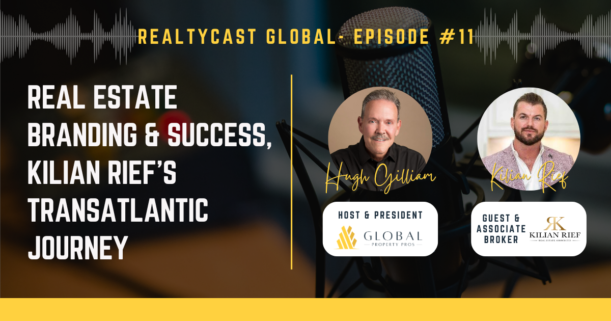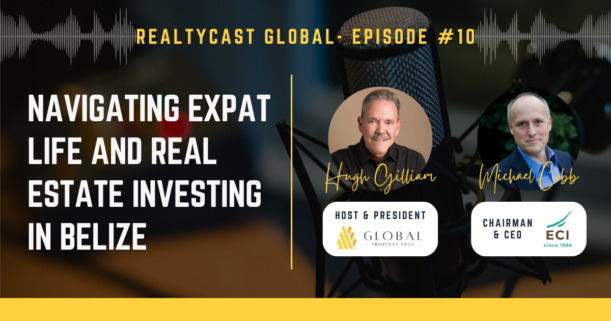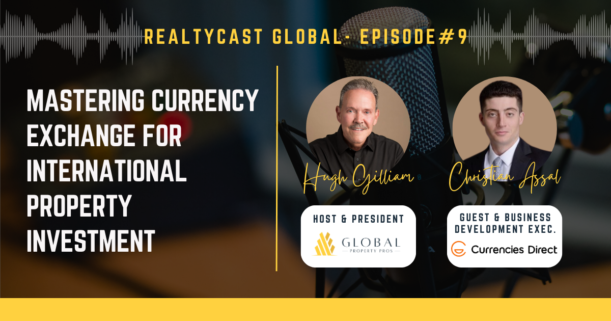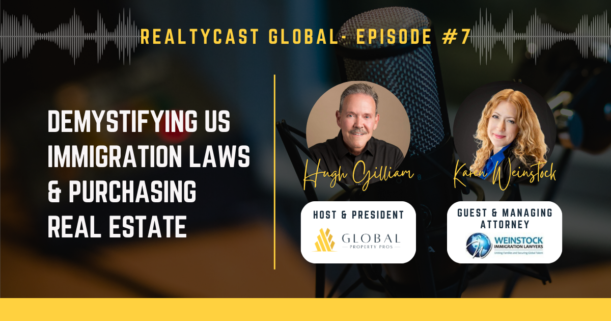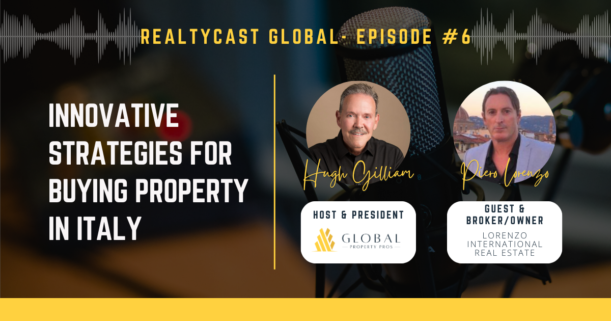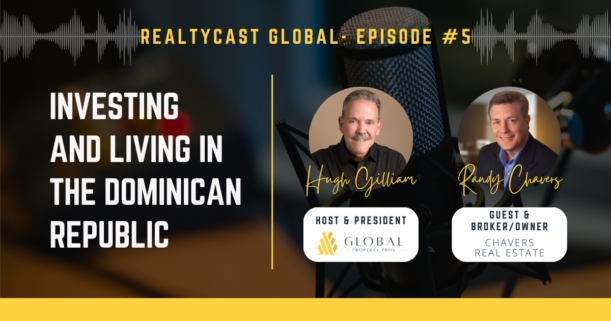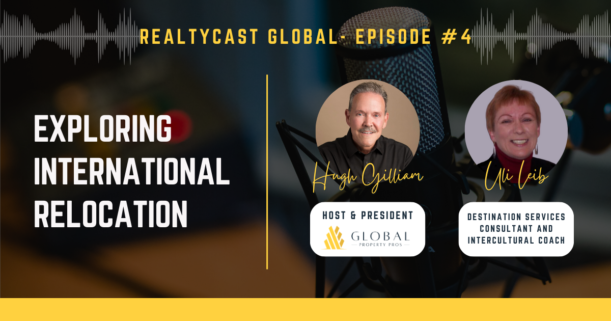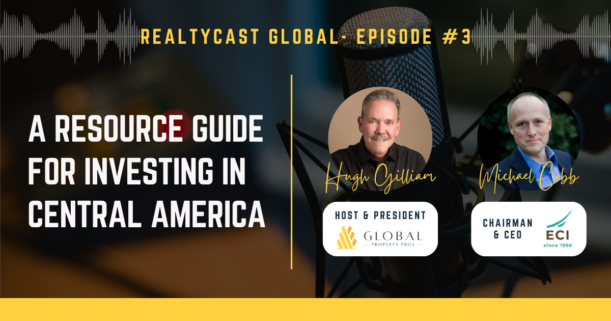RealtyCast Global #13: Panama Real Estate Insights and Investment Opportunities with Eric Van Hoorde
Welcome to episode #13 of RealtyCast Global – a global connection to all things real estate, hosted by Hugh Gilliam, president of Global Property Pros.
The Panama real estate market is a treasure trove of opportunities for investors, expats, and retirees alike. In this episode of RealtyCast Global, host Hugh invites Eric Van Hoorde, the past president of FIABCI Panama and owner of Van Hoorde Realty, to share his expert insights on the dynamic landscape of Panama’s property market. Through an engaging discussion, Eric uncovers the various facets of real estate investment, living conditions, and the promising prospects that Panama offers.
The episode kicks off with an exploration of the post-COVID real estate market in Panama. Eric elaborates on the significant changes and trends that have emerged, particularly in the commercial property sector. He highlights how the pandemic has influenced inventory absorption, making Panama an attractive destination for multinational companies. Government incentives play a crucial role in this scenario, enticing businesses to set up operations in the country, thereby bolstering the local economy.
Residential investments in Panama real estate are another focal point of the discussion. Eric identifies key neighborhoods like the financial district, Costa del Este, and Santa Maria as prime locations for high-return investments. These areas are particularly appealing to investors due to their proximity to multinational companies and essential amenities. The conversation also touches upon the growing interest in beach and mountain regions among expats and retirees. Remote work trends have further amplified the allure of these areas, offering a blend of tranquility and connectivity.
For those considering a move to Panama or purchasing Panama real estate, the episode provides a comprehensive guide on purchasing property as a foreigner. Eric explains that foreigners enjoy the same rights as locals, allowing them to buy property without needing a visa. The Permanent Residence for Qualified Investors visa is also discussed, highlighting its benefits for those investing $300,000 or more. This visa option is a gateway to residency, making it easier for investors to establish a presence in Panama.
Educational options for expatriate families are another critical aspect covered in the episode. Eric outlines the variety of schooling choices available, from American and Panamanian school calendars to international schools that cater to expatriate children. This diversity ensures a seamless transition for families moving to Panama, providing them with the necessary support to adapt to their new environment.
The luxury Panama real estate market takes center stage with the introduction of the Bioma project in Costa del Este. Eric delves into the details of this high-demand development, featuring amenity-packed apartments with terraces, high ceilings, and facilities like a two-star Michelin restaurant and a heliport. The rapid sales of Bioma, with 70% of units sold within ten months, underscore its investment potential. Practical considerations such as maintenance fees and the absence of selling restrictions for non-residents are also discussed, making it clear that Bioma represents a lucrative opportunity for investors.
Security and convenience are paramount in Panama’s residential neighborhoods. Eric compares gated communities in Panama to those in Miami, emphasizing the presence of security guards, gated entrances, and surveillance cameras. These measures ensure a safe living environment, giving residents peace of mind. Additionally, the abundance of shopping and entertainment options in suburban areas, including large modern shopping malls and essential services like clinics and drugstores, make these neighborhoods self-sufficient and highly desirable.
Panama’s climate is another attractive feature for potential residents. The country experiences a distinct rainy season from August to November and dry, summer-like months from December to March. This tropical climate, coupled with Panama’s vibrant culture and lifestyle, makes it an appealing destination for people from all walks of life.
As the episode concludes, Hugh reflects on his friendship with Eric and their shared experiences at International Real Estate Federation meetings. He expresses his gratitude for Eric’s invaluable insights and looks forward to future discussions on the evolving Panama real estate market.
In summary, this episode of RealtyCast Global offers a deep dive into the myriad opportunities and benefits of investing in the Panama real estate market. From government incentives and prime investment locations to luxury properties and expatriate living, Eric Van Hoorde provides a wealth of knowledge for anyone considering Panama as their next investment or residential destination. Tune in to gain a comprehensive understanding of what makes the Panama real estate market a standout choice in the global real estate landscape.
Listeners of this episode are treated to a masterclass in Panama real estate acquisition, an enlightening experience that provides clarity on the strategic approach to navigating this market. With the expert guidance of Arnulfo Arias, potential investors are equipped with the knowledge and confidence to stake their claim in the vibrant real estate scene of this strategic Central American nation.
For real estate agents looking to expand their business internationally, expose existing listings to a global pool of buyers, and connect with new clients, check out Global Property Pros.
For Property Buyers & Sellers seeking assistance in the international market, check out RealtyHive’s property marketing solutions.
SUBSCRIBE to the RealtyCast Podcast to be notified when new RealtyCast Global episodes air:
About the Guest – Eric Van Hoorde:
Real Estate Consultant for more than 24 years in the Real Estate sector of Panama, with extensive experience both nationally, in unions and in the private sector, and internationally representing Panama.
General Manager and founder of Van Hoorde Realty (Real Estate Consulting Company). President of ACOBIR (Panamanian Association of Real Estate Brokers and Promoters) during the period 2016-2017 and 2017-2018. President of FIABCI Panama during the period 2020-2022. President of FIABCI AMERICAS during the period 2020-2023. He is currently a member of the Board of Directors of FIABCI, International Real Estate Federation based in Paris.
He has participated in constant seminars, receiving distinctions for performance and sales achieved within the sector. At the same time he has been a speaker in constant talks and presentations supporting the Real Estate Sector.
He has a Master’s Degree in Business Administration with an emphasis in Finance, as well as a Bachelor’s degree in Economics and Finance from the University of South Florida. He also has various certifications from the NAR (National Association of Realtors, USA), such as CIPS, ABR, CRS, SRS, such as the distinction of International Realtor of Year 2018, being the only Panamanian to have received this distinction.
Website: https://vanhoorderealty.com/
Phone: +507 66167769
Email: Eric@VanHoordeRealty.com
About the host – Hugh Gilliam:
Hugh Gilliam co-owned a national transportation company, created a land development business, and worked as a general contractor in residential and commercial construction for over two decades. Hugh also co-founded an international distribution company and successfully negotiated and contracted with 135 sales representatives in the United States, Canada, France, Brazil, Japan, and the Netherlands.
Today, Mr. Gilliam is affiliated with RealtyHive, LLC where he serves as Director of International Real Estate and President of Global Property Pros. His duties include involvement in commercial and residential transactions, plus promoting marketing systems and lead generation platforms.
He is also co-founder of the luxury digital magazine, DOORWAYS INTERNATIONAL, powered by RealtyHive, which serves as a platform for Brokers and Buyers throughout 70 countries.
Hugh’s Designations Include:
- Certified Luxury Home Marketing Specialist
- Certified Distressed Property Export
- Certified International Property Specialist
- Certified International Investment & Immigration Specialist
- Transnational Referral Certification
Hugh’s Memberships Include:
- Georgia Association of REALTORS
- National Association of REALTORS
- International Real Estate Federation (FIABCI-USA)
- Asian Real Estate Association of America



